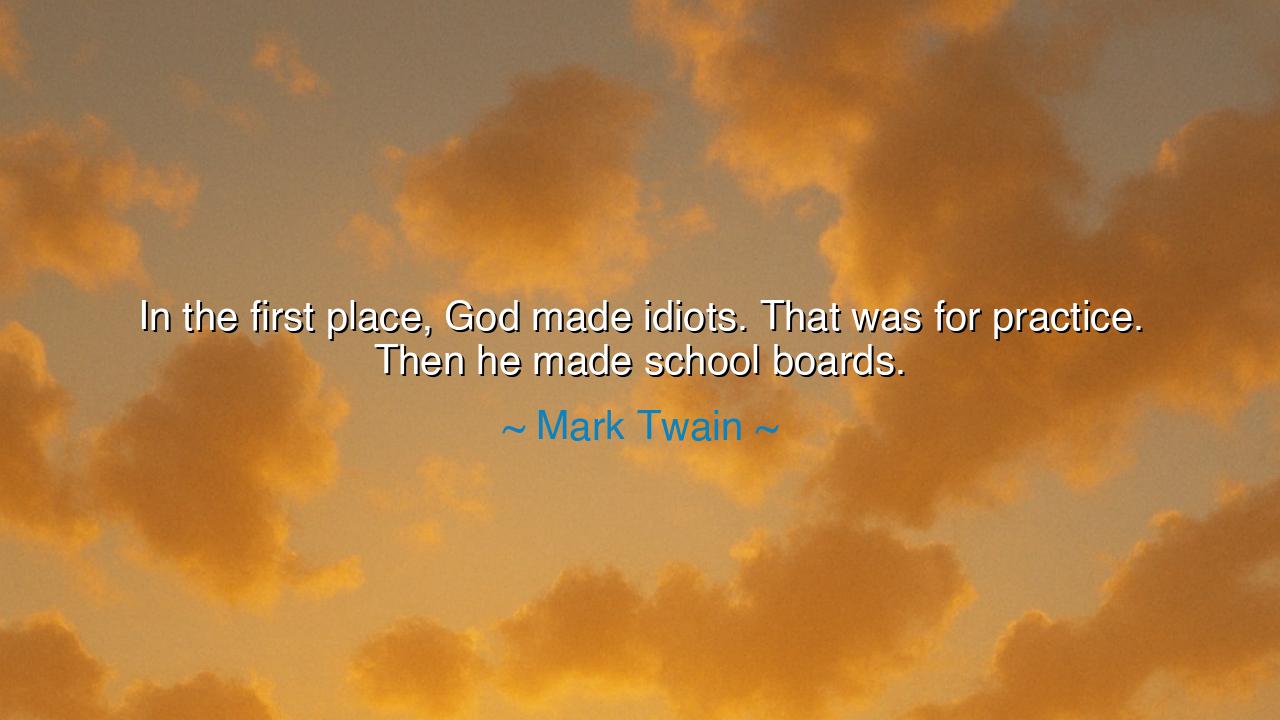
In the first place, God made idiots. That was for practice. Then
In the first place, God made idiots. That was for practice. Then he made school boards.






“In the first place, God made idiots. That was for practice. Then He made school boards.” So wrote Mark Twain, the sage of satire, the jester who wielded laughter as a sword against folly. These words, dripping with wit and irony, conceal beneath their humor a deep and enduring truth about the nature of power, pride, and human foolishness. Twain, in his bold and biting way, was not mocking the sacred, but the small-mindedness that so often infects those who hold authority — especially those entrusted with shaping young minds. His jest strikes not at learning itself, but at the arrogance of those who mistake control for wisdom, and bureaucracy for education.
In the age when Twain wrote, the American school system was young and turbulent, a battlefield between progress and pettiness. Committees and school boards — born from noble intent — too often became nests of ignorance, where ambition outweighed understanding and politics strangled truth. Twain, ever the watcher of human weakness, saw how institutions meant to uplift the mind could instead stifle creativity and punish intelligence. His humor was his rebellion, and in this single sentence, he held a mirror to society’s absurdity. “God made idiots,” he said, as though to remind us that foolishness is part of our nature — but when we organize it, give it rules, titles, and meeting minutes, it grows into something far more dangerous.
The heart of Twain’s humor was not cruelty, but moral vision. Beneath his mockery lies sorrow — sorrow that wisdom is so often ignored, and that the guardians of knowledge can become its jailers. He saw that education is not merely a system, but a spirit — one that cannot survive where conformity replaces curiosity. Thus his laughter was not that of a cynic, but of a prophet who sees men pretending to be wise while extinguishing the flame of youth’s imagination. In mocking the school board, Twain mocked every authority that values obedience over truth and procedure over purpose.
Consider the story of Galileo Galilei, the great astronomer who dared to say that the Earth moves around the sun. His revelation was met not with wonder, but with condemnation by the learned councils of his day — men who sat in judgment, calling themselves defenders of truth. Like the school boards of Twain’s jest, they mistook their ignorance for righteousness. Galileo was silenced, but his vision lived on, proving in time that no council, no board, no institution can bind the wings of truth forever. Twain’s humor echoes that lesson — that bureaucratic stupidity, when clothed in power, is among the most tragic forms of human folly.
And yet, Twain’s laughter invites us not merely to mock, but to awaken. For within the jest lies a warning: that every generation must guard the spirit of learning against the creeping vines of arrogance and complacency. The danger is not only in the school boardroom; it dwells wherever authority forgets humility, wherever decision-makers cease to learn, and wherever teachers or leaders become deaf to the voices of the young. Twain’s humor, though wrapped in jest, calls us to keep knowledge alive, not entombed in rules and red tape.
Education, in its truest form, is the liberation of the mind. It is the sacred work of freeing the soul from ignorance — not by force, but by wonder. When those in charge forget this, the lamp of wisdom grows dim, and the world stumbles in the dark. Twain’s quip may make us laugh, but it should also make us look inward: are we, in our systems and structures, encouraging thought, or smothering it? Are we raising seekers of truth, or merely obedient echoers of convention?
The lesson is clear: wisdom must never become institutionalized stupidity. Every teacher, every parent, every leader must remember that education is not the property of boards or bureaucrats, but the birthright of every child. Let humor be our guide, humility our guard, and truth our goal. Laugh, as Twain did, but learn from what we laugh at. For the world does not suffer from ignorance alone — it suffers when the ignorant are placed in charge of enlightenment.
So, my child, when you hear Twain’s words — “In the first place, God made idiots. That was for practice. Then He made school boards.” — smile, yes, but let the smile awaken thought. Let it remind you to honor true learning wherever it blooms, even in the humblest soul. Question authority, but seek wisdom. Defend knowledge, but never worship its institutions. For the greatest fools are not those who know nothing, but those who believe they know enough.






AAdministratorAdministrator
Welcome, honored guests. Please leave a comment, we will respond soon